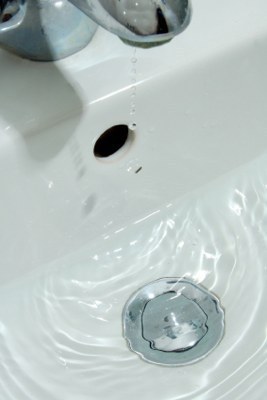After unplugging every gadget that wasn't being used, turning off every light that didn't need to burn, and replacing every appliance with an energy saving model, there still had to be an unseen way to save electricity. It wasn't until we played Monopoly that I made the connection between the utility companies. Saving water can save electricity as well.
While my home taps into the public water lines, those that have well water use electricity to pump their water. The connection between saving water and saving electricity is an easy one for those with well pumps hundreds of feet below the ground, pumping water and pulling electricity at each turn of the spigot.
To save water and therefore electricity, consider saving extra water runoff from rinsing dishes, wetting washcloths, or rinsing vegetables. Plug the sink and allow it to catch extra runoff that can be used later for washing. If the runoff is dirty, let it slip down the drain. It's the extra water from overfilling sprinkling cans or dousing a dusty item with a spritz of water that can be reused.
The larger connection between water and electricity is found in the hot water tap. If your water is heated by gas or oil, you're still saving money by using cold water. Water heating is one of the largest uses of energy in your home. While the water heater maintains the temperature of the water as a constant, it costs more to heat cold water than to maintain the temperature of already heated water.
One mistake that many people make is to turn the faucet to the middle when drawing water. We know that if we push it all the way to the right we have water that is quite cold and a turn all the way to the left produces hot water. This then leads to the assumption that midway is room temperature, when in fact midway is partially heated water.
Do you fill a pitcher of water with water drawn at the coldest temperature or water drawn halfway on the tap? Only the water that is coldest is completely drawn from your water supply without adding some of the heated and costlier water. Knowing this, it's actually cheaper to heat water on the stove or in the microwave than to pull already heated water from our faucet, according to one major electric company on the east coast.
Laundry is a large pull on the hot water supply. While hot water washing loosens dirt from fabrics best, it should only be used on the heavily soiled loads. Washing in cold water usually has the same effect as washing in warm or hot water. Try adjusting the wash temperature on a few loads a week and you'll see notable savings in your hot water usage.
Lastly, set the temperature on the hot water tank a few degrees lower. Like setting the thermostat for your house two degrees lower to save on heating fuel, setting the water heater's temperature lower not only prevents scalding, but will also save electricity.

Add your voice! Click below to comment. ThriftyFun is powered by your wisdom!
A lot of water is wasted while waiting for the warm water to come on in the shower. You can collect it in a bucket and use that water to flush the toilet or water plants.
I save water from the shower then use it for washing floors , cleaning the toilet, cleaning garbage cans etc. I throw a bucket full in the wash too. I also have a dishpan in the kit. sink so rinsing vegs or need to run water I don't waste it. I use it to water plants,
Add your voice! Click below to comment. ThriftyFun is powered by your wisdom!